A GUIDE FOR FINANCIAL FRAUD INVESTIGATION & PRECAUTION by SHIVANI SHARMA (thriller books to read txt) 📖
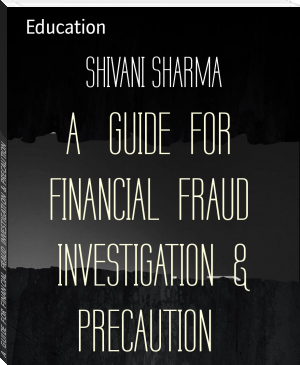
- Author: SHIVANI SHARMA
Book online «A GUIDE FOR FINANCIAL FRAUD INVESTIGATION & PRECAUTION by SHIVANI SHARMA (thriller books to read txt) 📖». Author SHIVANI SHARMA
In 2014, the European Union (EU) adopted legislation (Criminal Sanctions for Market Abuse Directive) that harmonises criminal sanctions for insider dealing. All EU Member States agreed to introduce maximum prison sentences of at least four years for serious cases of market manipulation and insider dealing, and at least two years for improper disclosure of insider information.[57]
Norway[edit]
In 2009, a journalist in Nettavisen (Thomas Gulbrandsen) was sentenced to 4 months in prison for insider trading.[58]
The longest prison sentence in a Norwegian trial where the main charge was insider trading, was for eight years (two suspended) when Alain Angelil was convicted in a district court on December 9, 2011.[59][60]
United Kingdom[edit]See also: UK company law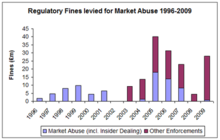 Regulatory fines imposed for market abuse in the UK 1996–2009. Source: from IMRO/PIA/SFA annual reports in LexisNexis 1996–2001; FSA Annual Reports, Appendix on Enforcements, 2003-2012. Further details in Tonks (2010)[61]
Regulatory fines imposed for market abuse in the UK 1996–2009. Source: from IMRO/PIA/SFA annual reports in LexisNexis 1996–2001; FSA Annual Reports, Appendix on Enforcements, 2003-2012. Further details in Tonks (2010)[61]
Although insider trading in the UK has been illegal since 1980, it proved difficult to successfully prosecute individuals accused of insider trading. There were a number of notorious cases where individuals were able to escape prosecution. Instead the UK regulators relied on a series of fines to punish market abuses.
These fines were widely perceived as an ineffective deterrent (Cole, 2007),[62] and there was a statement of intent by the UK regulator (the Financial Services Authority) to use its powers to enforce the legislation (specifically the Financial Services and Markets Act 2000). Between 2009–2012 the FSA secured 14 convictions in relation to insider dealing.
United States[edit]
Rajat Gupta, who had been managing partner of McKinsey & Co. and a director at Goldman Sachs Group Inc. and Procter & Gamble Co., was convicted by a federal jury in 2012 of leaking inside information to hedge fund manager Raj Rajaratnam. The case was prosecuted by the office of United States Attorney for the Southern District of New York Preet Bharara.[63]
With the guilty plea by Perkins Hixon in 2014 for insider trading from 2010–2013 while at Evercore Partners, Bharara said in a press release that 250 defendants whom his office had charged since August 2009 had now been convicted.[64]
On December 10, 2014, a federal appeals court overturned the insider trading convictions of two former hedge fund traders, Todd Newman and Anthony Chiasson, based on the "erroneous" instructions given to jurors by the trial judge.[65] The decision was expected to affect the appeal of the separate insider-trading conviction of former SAC Capital portfolio manager Michael Steinberg[66] and the U.S. Attorney[67] and the SEC[68] in 2015 did drop their cases against Steinberg and others.
In 2016, Sean Stewart, a former managing director at Perella Weinberg Partners LP and vice president at JPMorgan Chase, was convicted on allegations he tipped his father on pending health-care deals. The father, Robert Stewart, previously had pleaded guilty but didn’t testify during his son’s trial. It was argued that by way of compensation for the tip, the father had paid more than $10,000 for Sean's wedding photographer.[69]
In 2017, Billy Walters, Las Vegas sports bettor, was convicted of making $40 million on private information of Dallas-based dairy processing company Dean Foods. Walters's source, company director Thomas C. Davis employing a prepaid cell phone and sometimes the code words "Dallas Cowboys" for Dean Foods, helped him from 2008 to 2014 realize profits and avoid losses in the stock, the Federal jury found. In the trial, investor Carl C. Icahn was mentioned in relation to Walters's trading but was not charged with wrongdoing. Golfer Phil Mickelson "was also mentioned during the trial as someone who had traded in Dean Foods shares and once owed nearly $2 million in gambling debts to" Walters. Mickelson "made roughly $1 million trading Dean Foods shares; he agreed to forfeit those profits in a related civil case brought by the Securities and Exchange Commission". Walters's lawyer said he would appeal the verdict.[70]
Canada[edit]
In 2008, police uncovered an insider trading conspiracy involving Bay Street and Wall Street lawyer Gil Cornblum and another lawyer, Stan Grmovsek, who were found to have gained over $10 million in illegal profits over a 14-year span. Cornblum committed suicide before criminal charges were laid. Grmovsek pleaded guilty and was sentenced to 39 months in prison. This was the longest term ever imposed for insider trading in Canada. These crimes were explored in Mark Coakley's 2011 non-fiction book, Tip and Trade.
China[edit]
The majority of shares in China before 2005 were non-tradeable shares that were not sold on the stock exchange publicly but privately. To make shares more accessible, the China Securities Regulation Commission (CSRC) required the companies to convert the non-tradeable shares into trade-able shares. There was a deadline for companies to convert there shares and the deadline was short, due to this there was a massive amount of exchanges and in the midst of these exchanges many people committed insider trading knowing that the selling of these shares would affect prices. Chinese people did not fear insider trading as much as one may in the United States because there is no possibility of imprisonment. Punishment may include monetary fees or temporary relieving from a position in the company. The Chinese do not view insider trading as a crime worth prison time because generally the person has a clean record and a path of success with references to deter them from being viewed as a criminal. On October 1, 2015, Chinese fund manager Xu Xiangwas arrested due to insider trading.[71]
India[edit]
Insider Trading in India is an offense according to Sections 12A, 15G of the Securities and Exchange Board of India Act, 1992. Insider trading is when one with access to non public, price sensitive information about the securities of the company subscribes, buys, sells or deals, or agrees to do so or counsels another to do as principal or agent. Price sensitive information is information that materially affects the value of the securities. The penalty for insider trading is imprisonment, which may extend to five years, and a minimum of five lakh rupees (five hundred thousand) to twenty five crore rupees (two hundred and fifty million) or three times the profit made, whichever is higher.[72]
Standards for Legal Insider Trading[edit]
Insider trading is legal as long as disclosure of the holdings and trading in securities of the company is done by the insiders. Any other connected person or group of connected persons shall also disclose their holdings under this regulation.
The gist of these rules is that an insider cannot trade on non-public information until that information is disclosed, and cannot tip people off using non-public information.
SEBI Regulations For Disclosures of Trading by Insiders[edit]
Promoters, key managerial personnel and director of every company whose securities are listed on any recognized exchange shall disclose his holding of securities within 30 days of these regulations taking effect to the company. Every person on appointment as key managerial personnel, director of the company or upon becoming a promoter shall disclose his holding of securities of company within 7 days of such appointment to the company. Every promoter, director or employee of the company shall disclose to the company, the number of securities acquired or disposed of within two days of such transaction, if the value of securities traded through one transaction or series of transaction in a calendar quarter exceeds 10 lakh rupees or any other value as may be prescribed. Company needs to inform within two days of receipt of such disclosure to the stock exchange. Disclosure by the connected person shall be made as required by the company. Understanding Insider TradingThe U.S. Securities and Exchange Commission (SEC) defines illegal insider trading as the "buying or selling a security, in breach of a fiduciary duty or other relationship of trust and confidence, on the basis of material, nonpublic information about the security."
Material information is any information that could substantially impact an investor's decision to buy or sell the security. Non-public information is information that is not legally available to the public.
The question of legality stems from the SEC's attempt to maintain a fair marketplace. An individual who has access to insider information would have an unfair edge over other investors, who do not have the same access, and could potentially make larger profits than their fellow investors.
Illegal insider trading includes tipping others when you have any sort of nonpublic information. Legal insider trading happens when directors of the company purchase or sell shares, but they disclose their transactions legally. The Securities and Exchange Commission has rules to protect investments from the effects of insider trading.
KEY TAKEAWAYS Insider trading is the buying or selling of a publicly traded company's stock by someone who has non-public, material information about that stock Material information is any information that could substantially impact an investor's decision to buy or sell the security. Non-public information is information that is not legally available to the public Insider trading can be legal as long as it conforms to the rules set forth by the SEC Martha Stewart and Insider TradingDirectors of companies are not the only people who have the potential to be convicted of insider trading. In 2003, Martha Stewart was charged by the SEC with obstruction of justice and securities fraud – including insider trading – for her part in the 2001 ImClone case.
Stewart sold close to 4000 shares of biopharmaceutical company ImClone Systems based on information received from Peter Bacanovic, a broker at Merrill Lynch. Bacanovic's tip came after ImClone Systems' chief executive officer (CEO), Samuel Waksal, sold all his shares of the company. This came around the time ImClone was waiting on the Food and Drug Administration (FDA) for a decision on its cancer treatment, Erbitux.
Shortly after these sales, the FDA rejected ImClone's drug, causing shares to fall 16% in one day. The early sale by Stewart saved her a loss of $45,673. However, the sale was made based on a tip she received about Waksal selling his shares, which was not public information.
After a 2004 trial, Stewart was charged with lesser crimes of obstruction of a proceeding, conspiracy, and making false statements to federal investigators. Stewart served five months in a federal corrections facility.
Amazon Insider Trading CaseIn September 2017, former Amazon.com Inc. (AMZN) financial analyst Brett Kennedy was charged with insider trading. Authorities said Kennedy gave fellow University of Washington alumni Maziar
 The desire to acquire knowledge about the surrounding world and human society is quite natural and understandable for a person. Life is so developed that an uneducated person will never occupy a high position in any field. Humanity in its mass, and each person individually, develops objectively, regardless of certain life circumstances and obstacles, but with different intensity. The speed of development depends on the quality of training.
The desire to acquire knowledge about the surrounding world and human society is quite natural and understandable for a person. Life is so developed that an uneducated person will never occupy a high position in any field. Humanity in its mass, and each person individually, develops objectively, regardless of certain life circumstances and obstacles, but with different intensity. The speed of development depends on the quality of training.

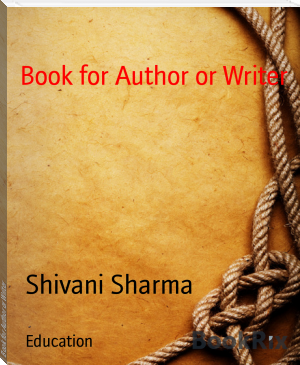
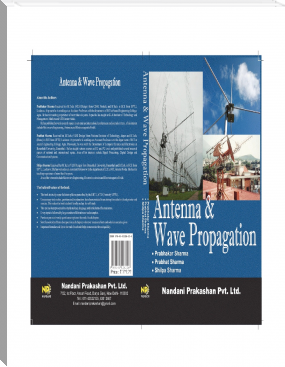
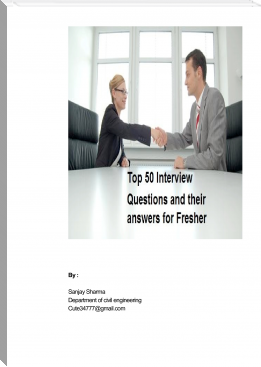
Comments (0)